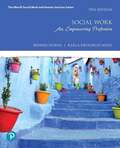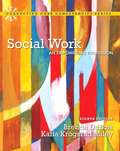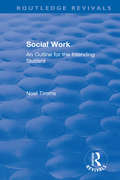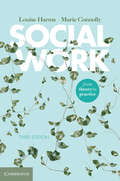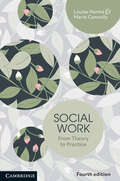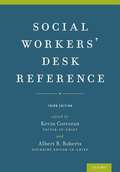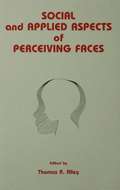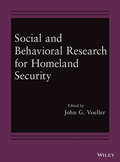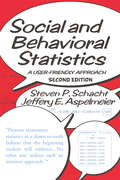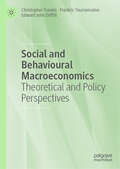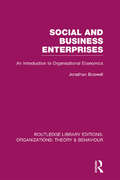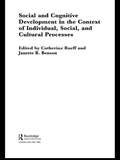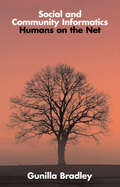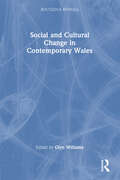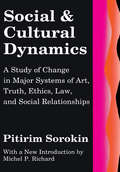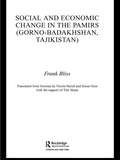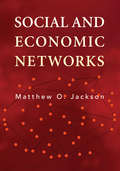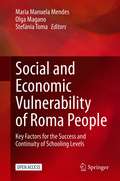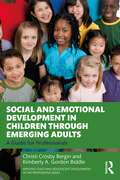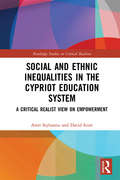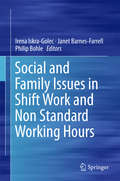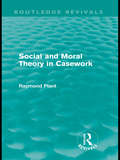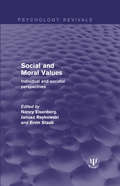- Table View
- List View
Social Work: An Empowering Profession
by Brenda Dubois Karla MileyWith its strengths and empowerment approach, Social Work: An Empowering Profession, 7 explores contemporary themes such as diversity and social justice and integrates the Council on Social Work Education's core competencies throughout. Each chapter reflects and integrates the core competencies in the 2008 Educational Policy and Accreditation Standards (EPAS) set by the Council on Social Work Education (CSWE). End-of-chapter assessment reinforces this integration, and MySocialWorkLab.com activities support the mastery of CSWE's core competencies.
Social Work: An Empowering Profession, 8th Edition
by Karla Krogsrud Miley Brenda L. DuboisApplies the empowerment perspective to the Social Work profession. Social Work: An Empowering Profession, 8/e introduces the social work profession and interweaves contemporary themes of strength, human rights, and social justices. In addition, this title details the empowerment-oriented roles of the social worker as consultant, resource manager, and educator. Connecting Core Competencies series -- Each chapter highlights the core competencies and practice behavior examples found in the Educational Policy and Accreditation Standards (EPAS) set by the Council on Social Work Education (CSWE). Critical thinking questions throughout reinforces these connections. Learning Goals Upon completing this book, readers will be able to: Understand the Social Work Profession. Apply principles of empowerment to various fields of social work practice. Apply critical thinking skills to case scenarios presented throughout the text. Analyze issues faced by clients using a human right and social frame. Examine personal perspectives and biases.
Social Work: An Outline for the Intending Student (Routledge Revivals: Noel Timms)
by Noel TimmsOriginally published in 1970, Social Work is an introduction for students and others who are thinking of taking up social work, or who want to know what social work is. The book begins by outlining the development of social work in the United Kingdom. It describes the methods social workers use, the knowledge they require in order to work effectively, the values they espouse, and the organisations within which they work. The book concludes with a detailed section on education and training for social work.
Social Work: From Theory to Practice
by Marie Connolly Louise HarmsSocial workers draw on a variety of theoretical perspectives to inform their practice and understand the diverse settings in which they work. Social Work: From Theory to Practice explores practice theories through the discipline's unique interpretive lens and demonstrates how these can be understood and enacted by practitioners in human services settings. This third edition includes new material on trauma-informed practice and Indigenous practice, as well as enhanced content relating to child protection and family violence, and narrative approaches. New practitioner reflections and case studies illustrate how theory influences practice and facilitates change. Thought-provoking case study discussion questions prompt students to reflect on key concepts and develop strategies for practice. Highly readable and engaging, Social Work: From Theory to Practice builds a strong foundation for theoretically informed practice. This text enables practitioners to develop the skills required to confidently and critically evaluate their work as they respond in complex practice contexts.
Social Work: From Theory to Practice
by Marie Connolly Louise HarmsSocial Work: From Theory to Practice provides a critical introduction to core and emerging theories of social work and teaches students in Australia and Aotearoa New Zealand how to apply these theories in their practice to facilitate change. The fourth edition introduces a cultural lens through which to interrogate theory. A new chapter on Aboriginal perspectives explores a range of theories, from emancipatory frameworks and approaches to deep listening and provides insights for students on how to decolonise their practice and responsibly provide socially just outcomes for communities. New discussions on navigating the service system, feminist and anti-oppressive approaches, sustainability and the impact of COVID-19 on social workers and the communities they serve are included throughout the book. Each chapter includes reflections from social workers and case examples with accompanying questions. New end-of-chapter questions help students engage critically with the content.
Social Work: Second Edition (Routledge Revivals)
by Andrew PithouseFirst published in 1998, this book sets out to shed sociological light upon the much under-researched realm of day-to-day child care practice. The text broke new ground when first published in 1987 and there have been few, if any, similar books that adopt an ethnographic approach to statutory child care practice. A second edition would still 'speak' to this rarely analysed occupational world. However, it would enjoy greater resonance when up-dated with practitioner viewpoints on the extent to which the findings remain pertinent today - which is likely to be the case. The book offers no conclusions other than it demonstrates that the 'invisible' world of practice cannot be readily understood or changed unless grasped through an interactionist sociology. The book is aimed at a social work/social welfare market as well as a sociology of profession/organization readership.
Social Workers and Compassion
by Stewart CollinsSocial Workers and Compassion is designed to assist social work students, social workers, social work managers, social care workers, and lecturers in developing knowledge, understanding, skills, and values related to various aspects of compassion. Focussing on social work in the UK, the various elements of compassion – compassion, compassion fatigue, compassion satisfaction, self-care, self-compassion, and mindfulness – are clearly located in a systemic, organisational, and structural context. The chapters draw upon evidence-based and evidence-informed sources and present critical perspectives that are linked to existing practices in social work education, social work, and the author’s own experiences. Drawing upon literature from social work and health care, social, organisational, work, and positive psychology, and from sociology and social policy from various parts of the world, the book will be of interest to international social work readers as well as professionals and professionals in training in the criminal justice, health care, counselling, and clinical psychology fields. It will be essential reading for social work students, lecturers, social care workers, social workers, and their managers.
Social Workers' Desk Reference, Third Edition
by Kevin Corcoran Albert R. RobertsPeople all over the world are confronted by issues such as poverty, a lack of access to quality education, unaffordable and or inadequate housing, and a lack of needed health and mental services on a daily basis. Due to these issues, there is a need for social workers who have access torelevant and timely scholarly materials in order to meet the needs of those facing these issues. The social, psychological, and biological factors resulting from these issues determine the level of a person's mental health at any given point in time and it is necessary for social workers to continueto evolve and develop to the new faces and challenges of the times in order to adequately understand the effects of these issues. In the first and second editions of the Social Workers' Desk Reference, the changes that were occurring in social work practice, education, and research were highlighted and focused upon. This third edition continues in the same tradition and continues to respond to the changes occurring in societyand how they are impacting the education, research, and practice of social work as a whole. With 159 chapters collaboratively written by luminaries in the profession, this third edition serves as a comprehensive guide to social work practice by providing the most recent conceptual knowledge andempirical evidence to aid in the understanding of the rapidly changing field of social work. Each chapter is short and contains practical information in addition to websites and updated references. Social work practitioners, educators, students, and other allied professionals can utilize the SocialWorkers' Desk Reference to gain interdisciplinary and interprofessional education, practice, and research.
Social and Applied Aspects of Perceiving Faces
by Thomas R. AlleyThis interdisciplinary overview integrates a variety of perspectives on the process and interpretation of faces as a major source of verbal and nonverbal communication. Written by authors from social, experimental, and cognitive psychology as well as from the dental sciences, Social and Applied Aspects of Perceiving Faces covers topics including normal variation in facial appearance and facial anomalies.
Social and Behavioral Research for Homeland Security
by John G. VoellerSocial and Behavioral Research for Homeland Security features articles from the Wiley Handbook of Science and Technology for Homeland Security covering social and psychological aspects of terrorism and counterterrorism efforts from different perspectives. First, it examines the roots of terrorism; second, it explores the consequences of terrorism; then communication, training, and learning development of responders and the public in situations of terror attacks, are discussed.
Social and Behavioral Statistics: A User-Friendly Approach
by Steven P. SchachtRevised and updated to include the behavioral sciences, the second edition of this introductory statistics book engages students with real-world examples and exercises. To the dismay of many social and behavioral science majors, successfully passing a statistics course in sociology, psychology, and most other social/behavioral science programs is required, and at many institutions statistics is becoming a university-wide requirement. In this newly revised text, the authors continue to make use of their proven stress-busting approach to teaching statistics to self-describe math phobic students. This book uses humorous examples and step-by-step presentations of statistical procedures to illustrate what are often complex and hard-to-grasp statistical concepts. Students and instructors will find this text to be a helpful, easy to interpret and thoroughly comprehensive introduction to social and behavioral statistics. Perfect for social and behavioral sciences upper-level undergrads fearful of that required stats course. It uses stress-busting features like cartoons and real-world examples to illustrate what are often complex and hard-to-grasp statistical concepts. Includes the newest and most necessary tools for students to master statistical skills making handouts or additional books unnecessary and gives instructors and their students a compact and affordable main text for their introductory stats courses.
Social and Behavioural Macroeconomics: Theoretical and Policy Perspectives
by Christopher Tsoukis Frédéric Tournemaine Edward John DriffillDespite significant theoretical advances in social and behavioural macroeconomics, little has been done to synthesise the disparate developments in these fields and point the way forward to future research directions and policy implications. This book reviews, unifies and extends diverse strands of thinking and shows how these theories can be used to improve macroeconomic modelling for policy development in a range of spheres. The book explores how the most empirically relevant socio-behavioural traits can widen the scope of macroeconomics to fruitfully address new issues and challenges, such as rising inequality, the change in the functional distribution of income (labour and capital shares), and a further understanding of the government spending multiplier. Chapters also address more traditional topics such as macroeconomic policy effectiveness, growth, saving and labour supply. Other, more open-ended themes of the book include whether the concept of individual rationality should be complemented by collective rationality; whether socio-behavioural traits underlie socially inefficient outcomes such as tragedies-of-the-commons, rat races, financial crises and global warming; and whether such traits can provide new foundations for (New) Keynesian macroeconomics. This book will be essential reading for advanced researchers and students working in macroeconomics and other social sciences, including psychology and politics, as well as those working on the theoretical end of public policy.
Social and Business Enterprises: An Introduction to Organisational Economics (Routledge Library Editions: Organizations)
by Jonathan BoswellThis book shows how economics can be used to clarify and stimulate thinking about organisations and their decision problems. It is mainly designed for university students of economics, management and business studies and of public and social administration. But its clear and lively exposition will have a wider appeal. The author introduces economic controversies on organisational power, exchange and self-interest, generosity and public spirit. He outlines many practical uses of such concepts as marginalism, opportunity cost, time preference and risk, scale economies and diseconomies, market power, public goods and externalities. He applies economics to business planning and budgeting problems and also to the problems of social enterprises in obtaining resources through charges and grants and in allocating these resources ‘efficiently’ and ‘fairly’. A distinctive feature of the book is that it analyses problems in the wide context of business, public and voluntary organisations. Unlike many conventional texts it is not highly abstract, technical or descriptive. Drawing on his extensive experience, the author provides many real-life and typical case studies to highlight his central theme: the fruitful interaction between abiding economic ideas and contemporary organisational problems.
Social and Cognitive Development in the Context of Individual, Social, and Cultural Processes (Routledge International Library Of Psychology Ser. #No.2)
by Catherine Raeff Janette B. BensonSeveral recent analyses have focused on how social and cultural factors shape development, but less well understood are the individual constructive processes involved in this interplay. This volume showcases varied theoretical and empirical approaches to how individual, social and cultural factors shape development, and suggests new directions for future scholarship.
Social and Community Informatics: Humans on the Net
by Gunilla BradleyAs a discipline, Informatics has developed over the years from its initial focus on data processing and software development, towards a more recent emphasis on people’s use of technology and its impact on their working and private lives. Gunilla Bradley, an internationally recognized expert in this field, has researched this area for many years and here, authors this indispensable volume on the topic. Providing a broad and deep analysis of the relationship between people, ICT, society and the environment, Bradley examines the impact on/change in organizations and individuals, both in the workplace and in the home. Taking a firmly humanistic view she also looks to the future as ICT increasingly transforms and impacts on our lives, and explores issues including stress, power, competence and psychosocial communication. She proposes normative research questions for the future and presents actions to achieve the Good ICT society. This thought-provoking book will be of interest to students and academics studying social informatics, computing and MIS as well as organizational behaviour, sociology, psychology and communications. Research-based and cross-disciplinary, Bradley's book is a valuable, and topical, resource.
Social and Cultural Change in Contemporary Wales (Routledge Revivals)
by Glyn WilliamsSocial and Cultural Change in Contemporary Wales (1978) draws together recent research specifically on Wales, to overcome the overly-English takes on the ‘social structure of modern Britain’. A pattern of relative social deprivation is outlined, and such symptoms of this deprivation as second home ownership, school closure, economic peripheralism and inadequate social services become the marker of Wales’ marginality. The cultural marker of note is the Welsh language, several of the papers discussing its erosion and the steps taken to preserve and maintain it. While ethnicity serves as an integrating force, there are also divisions based upon class, which are discussed.
Social and Cultural Dynamics: A Study of Change in Major Systems of Art, Truth, Ethics, Law and Social Relationships (Extending Horizons Ser.)
by Pitirim SorokinThis classic work is a revised and abridged version, in a single volume, of the work which more than any other catapulted Pitirim Sorokin into being one of the most famed figures of twentieth-century sociology. Its original publication occurred before World War II. This revised version, written some twenty years later, reflects a postwar environment. Earlier than most, Sorokin took the consequences of the breakdown of colonialism into account in discussing the renaissance of the great cultures of African and Asian civilization. Other than perhaps F.S.C. Northrop, no individual better incorporated the new role of the Indian, Chinese, Japanese, and Arabic peoples in this postwar world. Sorokin came to view social and cultural dynamics in terms of three major processes: a major shift of mankind's creative center from Europe to the Pacific; a progressive disintegration of the sensate culture; and finally the first blush of the emergence and growth of a new idealistic sociocultural order. This volume is perhaps most famous for revealing Sorokin's remarkable efforts to understand the relationship of war and peace to the process of social and political change. Contrary to received wisdom, he shows that the magnitude and depth of war grows in periods of social, cultural, and territorial expansion by the nation. In short, war is just as often a function of development as it is of social decay. This long-unavailable volume remains one of the major touchstones by which we can judge efforts to create an international social science. There are few areas of social or cultural life that are not covered—from painting, art, and music, to the ethos of universalism and particularism. These are terms which Sorokin introduced into the literature long before the rise of functional doctrines. For all those interested in cultural and historical processes, this volume provides the essence of Sorokin's remarkably prescient effort to achieve sociological transcendence, by takin
Social and Economic Change in the Pamirs (Gorno-Badakhshan, Tajikistan): Translated from German by Nicola Pacult and Sonia Guss with support of Tim Sharp
by Frank BlissSince Olufsen and Schulz published their monographs on the Pamirs in 1904 and 1914, respectively, this is the first book to deal with the history, anthropology and recent social and economic development of the Pamiri people in Gorno-Badakhshan, Eastern Tajikistan. After the collapse of the Soviet Union, such high mountain areas were more or less forgotten and people would have suffered severely from their isolation if an Aga Khan Foundation project in 1993 to 1994 had not afforded broader support. The reader will be confronted by an almost surrealistic world: Pamiri income and living conditions after 1991 dropped to the level of a poor Sahelian country. Former scientists, university professors and engineers found themselves using ox-ploughs to plant potatoes and wheat for survival. On the other hand, 100% literacy and excellent skills proved to be an enormous human capital resource for economic recovery. The first sign of this was an increase in agricultural production, something that had never occurred during Soviet times.
Social and Economic Networks
by Matthew O. JacksonNetworks of relationships help determine the careers that people choose, the jobs they obtain, the products they buy, and how they vote. The many aspects of our lives that are governed by social networks make it critical to understand how they impact behavior, which network structures are likely to emerge in a society, and why we organize ourselves as we do. In Social and Economic Networks, Matthew Jackson offers a comprehensive introduction to social and economic networks, drawing on the latest findings in economics, sociology, computer science, physics, and mathematics. He provides empirical background on networks and the regularities that they exhibit, and discusses random graph-based models and strategic models of network formation. He helps readers to understand behavior in networked societies, with a detailed analysis of learning and diffusion in networks, decision making by individuals who are influenced by their social neighbors, game theory and markets on networks, and a host of related subjects. Jackson also describes the varied statistical and modeling techniques used to analyze social networks. Each chapter includes exercises to aid students in their analysis of how networks function. This book is an indispensable resource for students and researchers in economics, mathematics, physics, sociology, and business.
Social and Economic Vulnerability of Roma People: Key Factors for the Success and Continuity of Schooling Levels
by Maria Manuela Mendes Olga Magano Stefánia TomaThis open access volume provides an understanding of the different aspects of success, school continuity and social mobility among European Roma, including the motives justifying the high rates of school dropout and failure among this group. It offers a critical and reflexive perspective about social reality from a multidisciplinary and transversal point of view, sharing knowledge and practices in different countries about the articulations between Roma families, individuals, school and public policies. Over time, there has been an increase in the educational attainment of European citizens, but there are still persistent inequalities between Roma and non-Roma, including gender inequalities, which greatly affect Roma women. The volume explores the issue of Roma education and includes chapters from Western European, South and Central and Eastern European researchers using different theoretical and methodological perspectives. The intersection of this diversity and plurality of standpoints makes possible to obtain a comprehensive view on the education and schooling of European Roma.
Social and Emotional Development in Children through Emerging Adults: A Guide for Professionals (Applying Child and Adolescent Development in the Professions Series)
by Christi Crosby Bergin Kimberly A. Gordon BiddleThis concise guide offers an introduction to how children and young people develop social and emotional competence, and how they display appropriate social behavior and emotional expression at different ages.Explaining the role of adults in a range of contexts and settings, this volume offers strategies for supporting competence and highlights key topics, such as attachment, prosocial behavior, social perspective taking, ethnic identity, social and emotional learning, gender identity, parenting styles, and much more. Moving through the different ages of childhood to emerging adulthood, the authors detail social and emotional development and the development of the self. They also offer strategies to foster social–emotional competence through these different ages.Social and Emotional Development in Children through Emerging Adults is designed for students and professionals in psychological, educational, health and social work settings who want to support and nurture children and young people to ensure their needs are met.
Social and Ethnic Inequalities in the Cypriot Education System: A Critical Realist View on Empowerment (Routledge Studies in Critical Realism)
by David Scott Areti StylianouAccommodating the diversity of learners in mainstream schooling and providing high quality education for all, inclusive education is prioritised at international and European levels as a human rights issue and as a reform strategy which tackles inequalities and promotes social cohesion within both schools and wider society. This book advances critical realist ideas in empirical research in order to close the theory–practice gap and shift the emphasis from epistemology to ontology with regard to teachers’ empowerment to provide inclusive education. With a focus on the school context rather than the agency of the individual teacher, the authors use empirical data from case studies to demonstrate teachers’ disempowerment as real, and rooted in features of reality. Offering a unified critical realist model, the book challenges taken-for-granted ideas and practices concerning the empowerment of teachers in inclusive education and seeks to set the ground for a more holistic and inclusive educational change.
Social and Family Issues in Shift Work and Non Standard Working Hours
by Irena Iskra-Golec Janet Barnes-Farrell Philip BohleThis book explores the effects of shift work and non standard working hours on family and social life. It features analysis and case studies from an international body of researchers from Europe, the Americas and Australia. It includes contributions from Germany, the United States, the Netherlands, Croatia, Italy, Poland, Australia, and Brazil, that fully examine this increasingly prevalent, and global, issue. The book starts by introducing the problems of work-family linkages, shift work and non-standard work hours. Next, it details the consequences of specific features of shift schedules, such as decreased opportunities for social participation, family problems and negative effects on partners and children as well as the impact of working time arrangements on work-family conflict over time. The book then looks at the consequences of shift work and non-standard work hours on family members and the workers themselves, including the sleep and daytime functioning of adolescent family members and the ways that non-standard work schedules intersect with the particular challenges and stresses of family responsibilities and strategies that workers use to manage these challenges in sectors where non-standard schedules are the norm. Last, the book considers the role of individual differences in understanding problems of work-family relationships, including a consideration of safety and health at work from the perspective of gender and an examination of the moderating role of chronotype and circadian type characteristics on work-family conflict and work-family facilitation among male shift workers.
Social and Moral Theory in Casework (Routledge Revivals)
by Raymond PlantFirst published in 1970, the aim of the book is to 'map the logical geography' of an important set of concepts which enter into the theory of social casework - those concerning the individual and society. Concepts examined include the individually orientated values of 'self-direction' and 'acceptance', and those of 'role', 'adjustment' and 'integration', which express the individual's relation to society. The author's main concern is to see whether a coherent theory of the relationship between individual and society can be given in terms of these concepts and to argue that such a theory is fundamental to casework discussion. Mr Plant also discusses what, if any, social or political commitments the activity of casework presupposes, and evaluates the view that casework is 'apolitical'.
Social and Moral Values: Individual and Societal Perspectives (Psychology Revivals)
by Nancy Eisenberg Ervin Staub Janusz ReykowskiOriginally published in 1989, this joint venture of American and Polish psychologists provides an international perspective on the psychological factors that make people attend to the well-being of others and of society. The individual sections focus on: theoretical perspectives in the nature of values; the development of positive values; the place of values in various types of decisions; the regulation of behaviors through values and the relation of values to behavioral outcomes; and sociopolitical, socioeconomic, and historical perspectives on values.
